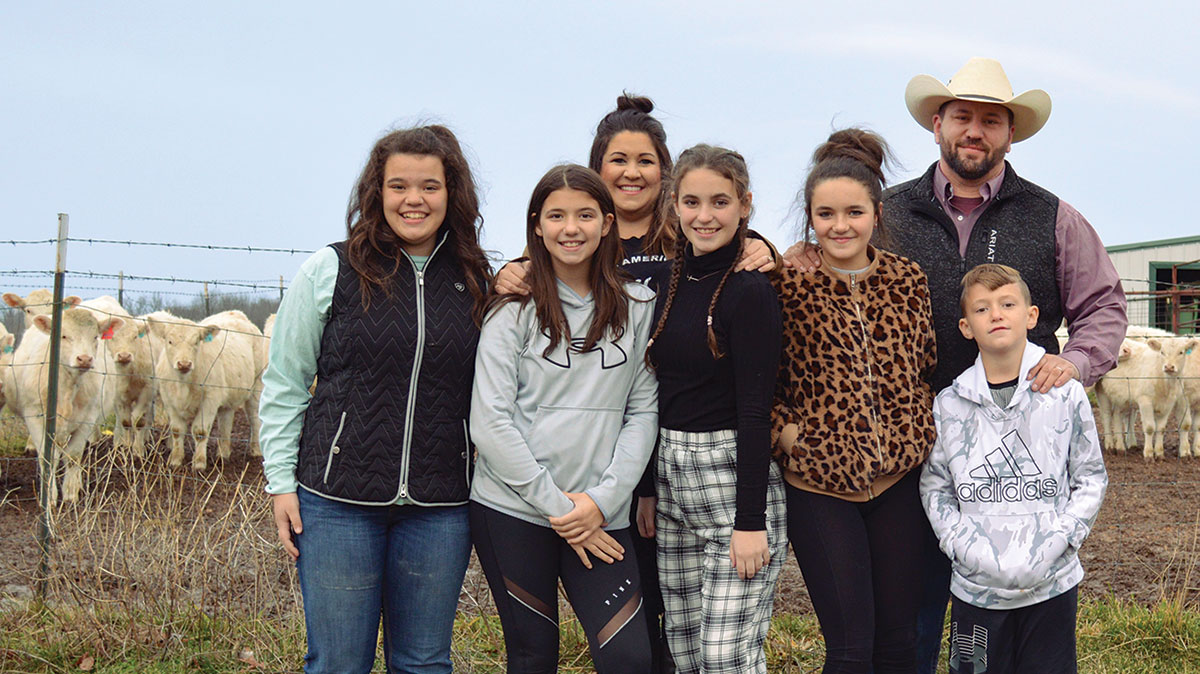
Jerry and Barb White of Purdy, Mo., have converged the conventional with the uncommon, in both breed and technology. Though a full-time insurance business owner, Jerry has always taken time to maintain a herd of commercial Angus cattle. Three years ago, Jerry became intrigued with a little known breed, Wagyu, and decided to try something new.
Wagyu is a Japanese breed of cattle. By appearance, the Wagyu look scroungy compared to a massively structured Angus, or as Jerry said, “They look kind of like an old Jersey, that’s black.” The cattle are raised for their superior quality of beef. “They are a Japanese breed that is between 400-500 years old. They were bred to work in the rice fields because of their endurance. Genetically, they are unique from any other cattle,” Jerry explained. In restaurants, Wagyu steaks are typically priced at $65 per pound because of their taste and excellent marbling. Nutritionally, the meat is completely unique compared to all other beef. It is high in Omega 3’s and B6 and B12 vitamins, and low in cholesterol and saturated fat.
Jerry first heard of the breed when reading an article in the Joplin Globe several years ago. After researching the breed further, and inquiring with Dr. Cupps, veterinarian in Cassville, Mo., about breeding tactics, Jerry found two cows, locally, to begin his herd with.
Jerry then came up with a strategy of embryo transfer to begin a herd of purebred Wagyu cattle. In this intense and timely process, the two Wagyu cows were given shots to induce the production of a flush of eggs, which are harvested and then combined with sperm of a purebred AI Wagyu bull. Six days later, live and healthy embryos are checked under the microscope, “It is very interesting to see the embryos. The whole process is incredible,” said Barb. The healthy six-day old embryos are then transferred into the uterus of cows which have had a series of shots to prepare them for accepting the pregnancy.
Though the process seems fairly simple, there are a lot of variables, and the percentages of viable embryos and accepted pregnancies can be low. Jerry has done the embryo transfer twice now, and will start having his second round of purebred Wagyus from the bred Angus cows next month. “It is a very expensive process, and takes a lot of time,” Jerry said as he explained the intense process of shots and preparing the cattle. He used a group of heifers from his Angus herd and has had no calving problems. “Wagyu bulls are good for calving ease, they throw 40-pound calves.”
From the embryo transfer process, Jerry and Barb have built a growing herd of the rare breed. Another interesting factor of Wagyu calves being born from Angus mothers, “Wagyu cows have compact udders and not as much milk as the Angus. The Angus momma’s milk production has provided their calves with better growth.”
With the uniqueness of this breed, also comes the need for special marketing. This slighter smaller stature, slower growing cattle with high-quality meat cannot be sold as the typical commercial, feedlot market calves would. Because of their slow growth, more time and money is put into the animal before it can be sold as a finished beef. “I would like to find a restaurant that would buy the whole carcass, not just the steaks,” said Jerry. He also thinks that farmers might consider buying a cow, not for addition to their beef herd, but for personal use in growing out their own beef, “The quality is so good, that it is worth it to have a cow just to produce calves to butcher for the family.” Marketing strategies are pretty open for this breed just budding in popularity, as Jerry considers marketing of the beef, heifers and bulls.
In restaurants, the Wagyu are usually listed as Kobe beef, “The term Kobe can only be used for Wagyu raised in the Kobe area of Japan,” explained Jerry. He explained that the Japanese take time to grow them out special, “They are fed beer and sake and massaged daily. Some people think that the beer fattens them, but the purpose is to increase appetite so that they will eat more.” Here in the United States, they are some cattle growers marketing, “American style Kobe beef,” which Jerry explained is an Angus/Wagyu cross, “The crossbred cattle do very well, and the meat is still good quality.”
Even though the White’s have focused some special attention on the new breed, they still maintain their established Angus herd. “We’ve had Angus for 40 years,” said Jerry who believes in buying good bulls and building his herd with his own replacement stock, “I haven’t bought any heifers in 30 years.” Jerry, who grew up with cattle and has always had cattle of his own, likes what he is doing, “The farm has always been something I’ve enjoyed doing.”







